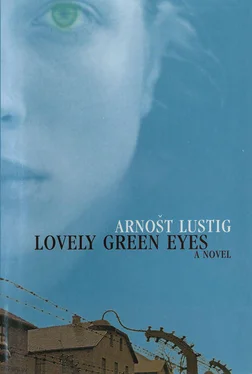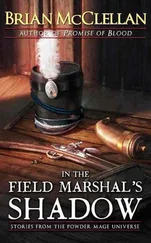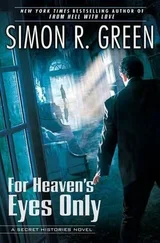“The Germans are still gentlemen,” observed Madam Kulikowa. “Knights without fear and blemish. They know how to share even what they steal.”
Skinny shared her parcel with the rest of the girls. The Madam took the salted beef.
Twelve: Karl Meissner, Hans Bellow, Anton Bruckner, Frank Epp, Hermann Fegelein, Fritz Albert Klausen, Gustav Kriebel, Rainer Maria Hilger, Donar Hörbiger, Alex Neurath, Uwe Schmidt, Kurt Witzig.
Estelle held Skinny by her hand.
“I’d never been with anyone before. I didn’t have it off with him; he had it off with me. He told me I was nice and if I weren’t a whore he’d marry me. He waited for me to moan. So I moaned. He wanted me to open my legs; to put them on his shoulders. I heard myself croaking. I was gasping for air. He said it was so good. It hurt me, and I was covered in cold sweat. He slapped my bottom — as a reward. Out of sheer fear I smiled at him. Then he fell asleep. He was no longer interested in me. No-one was ever interested in me afterwards.”
She didn’t mention those two soldiers, brothers perhaps or cousins, who it was rumoured she was interested in.
The sky, frosty, deep blue and clear, was filling with stars. The Madam announced that it was Christmas Day.
“Do you also imagine God as a shiny fish?” Estelle asked. She looked at Skinny.
“Were you really in a camp? Like the Madam? She was in the Aryan section.”
The wolves were howling outside the windows.
Behind their words self-denial was hiding; that secret life no-one knows about, that life which had deformed them, but in which there was still a grain of hope.
“When I lie next to you, things come back to me,” Estelle said. “I’m walking in the park with my mother. She was raven-haired, like I am. I run ahead, stop in front of her and face her, so she has to stop too. And I say to her ‘Mummy, you’re walking too fast’. And then I do it again and say ‘Mummy, your breasts are wobbling too much’. My mother stares ahead, as if she’s lost in thought. Am I really there? I say ‘Mummy, why are you looking so odd?’”
Skinny did not tell Estelle that they were killing people at Auschwitz-Birkenau from morning to night and from night to morning, killing on a conveyor belt. She said nothing about the prisoners who were grinding the bones of the dead into fertilizer that was taken away by rail in open wagons. About the mass murders which had become commonplace. About the women waiting their turn in snow and ice and rain, powerless and emaciated. They were no longer being moved by trucks; fuel had to be saved. They had to trudge along, step after step. She remained silent about the things the Germans had thought up in order to cleanse the planet of the inferior race. About the sick bay where experiments were carried out on human beings.
About the killing of children and the sick, as well as the healthy for punishment, simply to make room for the next transportées. About what seemed normal to the S S men in their service to Germany; about what, after a few weeks, no longer seemed insane to her because it was being repeated every day. That was what she had escaped to save herself.
It occurred to her, as it had before, that Estelle might not believe her. She would not have believed it herself if she hadn’t been there. And she only knew a fraction of it, the general picture, the taste of damp ash, the choking smell of charred bones like the smell of boiled glue.
“I ran away so I didn’t have to go to a camp as you did,” Estelle said. Skinny remained silent. Estelle turned over in bed and caught hold of her with both hands. She was not the only one to have run away and ended up here. Perhaps she’d just had a different reason. That unknown reason was a bond between them.
“I don’t have to see killing first-hand. What’s here is quite enough for me — what they did to Big Belly and Krikri, and maybe Maria-Giselle.”
“They don’t give you a choice,” Skinny said.
“Is it the same there as here?”
“No, it’s not. Except that neither there nor here can you get out.”
Skinny wondered why the camp had such a fascination for Estelle. Why was she thinking about it so much?
“What did you do there?”
“I assisted the doctor.”
“Would they have sterilized me?”
“They sterilized all the girls.”
“Did you have any of your family there?”
“Did you?”
“My grandfather.” She let go of Skinny’s hands.
For a while they were both silent.
“Is it a sin to want to die?”
“Why do you ask me?” Skinny said.
“Is it a sin not to want to die?” Estelle asked.
“Some decide to die with honour if they can’t live with honour. That’s why my father killed himself.”
“I know why you’re saying this to me. You probably know why I’m asking.”
“You too?” Skinny breathed.
It was out now. They had both betrayed themselves, simultaneously. Estelle bit her lips. A little drop of blood appeared, which she licked off in the dark. What would they do with this knowledge, now or tomorrow? What would it do to them?
The moon had risen to its highest point. In a while it would begin to go down. From the field kitchen, wafted by the wind, came smoke and the smell of pea soup with bacon and lard.
In the morning Long-Legs gave Skinny ten marks. “An interest-free loan from an Obersoldat.”
“If they caught you!”
“That takes two. It doesn’t matter whether you steal or not, just don’t get caught.”
While peeling potatoes in the kitchen Skinny had stolen a tin of Slovak chicken. She would share it with Beautiful. It was already cooked, all she had to do was let it thaw out. Had Beautiful heard her and Estelle talking during the night? She slept right next to them.
Twelve: Jürgen Henning, Werner Schlossberg, Erhardt Kassel-Kahdun, Heinz Fe si, Ifoel Schulte, Gerd Siemens, Franz Otto Schröder, Oskar Herder-Altmann, Helmuth Krantz, Otmar Bartelsmann, Kurt Biedenkopf, Reinhardt Eich-Ochmanek.
It was Saturday. Snow was falling. The yard was noisy with truck engines, German shouts and laughter. Piled on the rubbish heap in the corner were broken mugs, pieces of rusty metal and swept-up spent cartridges. All that would be tidied up and removed before the inspectors arrived from the Wehrkreis. Some infantrymen outside the brothel were whistling and calling to one another. Here the German army was not retreating but advancing towards its goals. The guards on the towers heard the same dirty jokes for the hundredth time.
“A little debauchery does no harm, no debauchery does a lot,” a lanky youngster shouted across the yard. A lock of pale hair showed under his cap. He could not be more than eighteen; this was his first visit to the brothel. He had already had his baptism of fire in battle. There was a new medal on his tunic.
“Everything in moderation,” muttered Oberführer Schimmelpfennig. Steam was rising from his mouth. He had no wish to act as a father figure. There was no point in cursing the frost. They would all get their full measure of winter.
The brothel was a long low building. The men leaving it were almost creeping along, some of them let their knees give way. They were greeted with jeers in the yard.
“I’ve been here before. You’ll read about it in the book on the descendants of the SS,” one S S man shouted.
The soldiers by the vehicles stood with their hands in their pockets. The Oberführer noted with chagrin that the sight of the army from here was grotesque. That morning he had received a report of a tactical withdrawal. If this batch of troops were thinking that No. 232 Ost was some Lusthaus in France they were mistaken. All they had to do was listen to the approaching artillery fire. The Oberführer would be glad if he was transferred. He was not sure where he would prefer to serve — one’s head was on the block wherever one went. But it was disagreeable to have the Russians at one’s heels. He had a vision of the devil, tongue sticking out and genitals exposed, approaching with giant strides. He had more than once considered applying for a transfer to the front. Here it was not as comfortable as they might think in Berlin.
Читать дальше


![Корнелл Вулрич - Eyes That Watch You [= The Case of the Talking Eyes]](/books/32103/kornell-vulrich-eyes-that-watch-you-the-case-of-thumb.webp)









